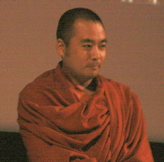
I interview Neten Chokling Rinpoche, a 33 year old Tibetan lama who was recently in the San Francisco Bay Area for the screening of his just-released film on the Life of Milarepa. Milarepa was an 11th Century Tibetan yogi, folk hero, and saint who is greatly revered throughout Tibet. Milarepa, who early in his life had murdered to avenge his parents and later reformed through meditation is considered a model for achieving enlightenment in a single lifetime.The opportunity to interview Neten Chokling Rinpoche arose unexpectedly and I was pleased to jump on it. This young Rimpoche has not only directed his first feature-length film but also heads up three different montastaries, in India, Butahn and Tibet. He is hoping that the film will bring in enough money to help him feed and clothe some 40 destitute young boys he has taken in, as well as the many monks he is responsible for.The Rinpoche became acquainted with the world of film at age 19 in which he stared in a feature-length film about young Tibetan monks called, “The Cup.” If you haven’t seen this film, I highly recommend it. You could probably find it at a good video rental store.You can purchase his film, “The Life of Milarepa” on DVD by going to www.milarepamovie.com. We close with a piece of podsafe music which seems particularly appropriate for our interview with the Rinpoche. It’s called “Peace Around The World,” performed by Freedom People.
Podcast: Play in new window | Download
Subscribe: Apple Podcasts | RSS
I always like shows with buddhist content. I don’t buy all the buddhist concepts and philosophies (eg I don’t care very much about the concept of Nirvana or the discussion if there is a self or not), but some ideas are really helpful and highly usable.
A book that I really like is “The Lost Art of Compassion” by Dr.Lorne Ladner. Ladner is a clinical psychologist in private practice, and at the same time the director of the Buddhist Guhyasamaja Center in Nortern Virginia.
In his books he tries to bridge the gap between east and west. He introduces some essential tibetan buddhist exercises and concepts and tries to view and analyize these concepts also from a psychological point of view.
Very enjoyable and fascinating, if you are into buddhism (and psychology).
Reinhard from Austria